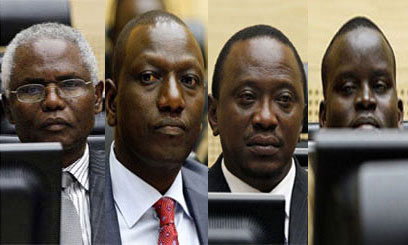
Commissioner Lawrence Mute said on Monday that Kenya has all along been unwilling to put in place a special tribunal/FILE
NAIROBI, Kenya, Apr 30 – The Kenya National Commission on Human Rights (KNCHR) has dismissed the governments latest bid to have four Kenyans facing charges at the International Criminal Court (ICC) tried at the East African Court of Justice (EACJ) in Arusha.
Commissioner Lawrence Mute said on Monday that Kenya has all along been unwilling to put in place a special tribunal or use its judicial framework to seek justice for victims hence the ICC should be left to do its work.
“After Kenya and Africa have discussed the ICC almost as a theoretical subject for a couple of years, it seems to us that suddenly key politicians in Kenya and Africa are realising that the Court will genuinely offer redress against human rights violations and criminal acts,” Mute said at a press conference.
He said asking that the suspects be tried locally was aimed at protecting them and yet providing solutions for victims of the violence was not on the agenda.
“The wheels of international justice seem to be moving fast,” he added in relation to the recent convictions of Thomas Lubanga of the Democratic Republic of Congo by the ICC and Former Liberia President Charles Taylor by the Special Court for Sierra Leone.
“This has caused a lot of disquiet amongst African leaders and the current attempts against the ICC are a reinforcement of African leader’s perception of the ICC as a neo-colonial Court which only targets Africans,” he added.
Last week the East African Legislative Assembly (EALA) unanimously approved and adopted a motion urging the East African Community (EAC) Presidents to call for the transfer of the Kenyan post election violence cases to the East African Court of Justice.
In the same week, the 10th Extra Ordinary Session of the East African Community summit held in Arusha also resolved to extend the jurisdiction of the East African Court of Justice to cover crimes against humanity.
However, Mute said states could not ask the ICC to transfer a case to a particular judicial body or institution.
“An institution such as the EALA cannot file an admissibility challenge and neither can the AU since they are not parties to the Rome Statute,” the Commissioner said.
He noted that the judicial arms of EALA and the AU had no jurisdiction over criminal conduct and the key authority of the EACJ was the interpretation and application of the EAC Treaty.
“ICC will not cede jurisdiction to a body which does not have jurisdiction and which has never handled similar cases before and has no framework for doing so,” Mute said.
He noted that even if the EAC put in place a new protocol, it would be relevant for future cases as opposed to ongoing cases
“For as long as the discussions focus on only the suspects, particularly the four, the feeling will remain that these attempts are not genuine justice seeking efforts but rather efforts to shield certain individuals,” he stated









































